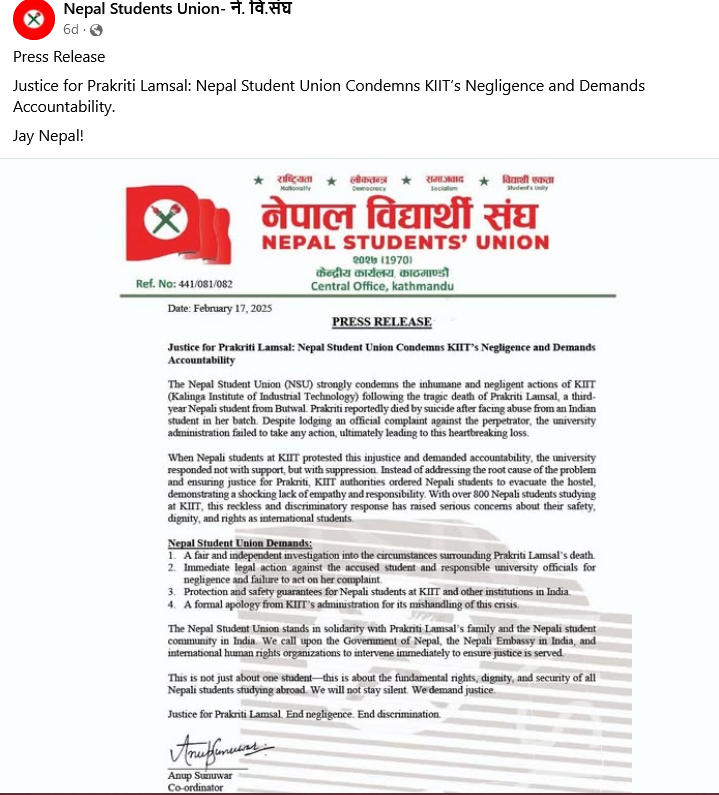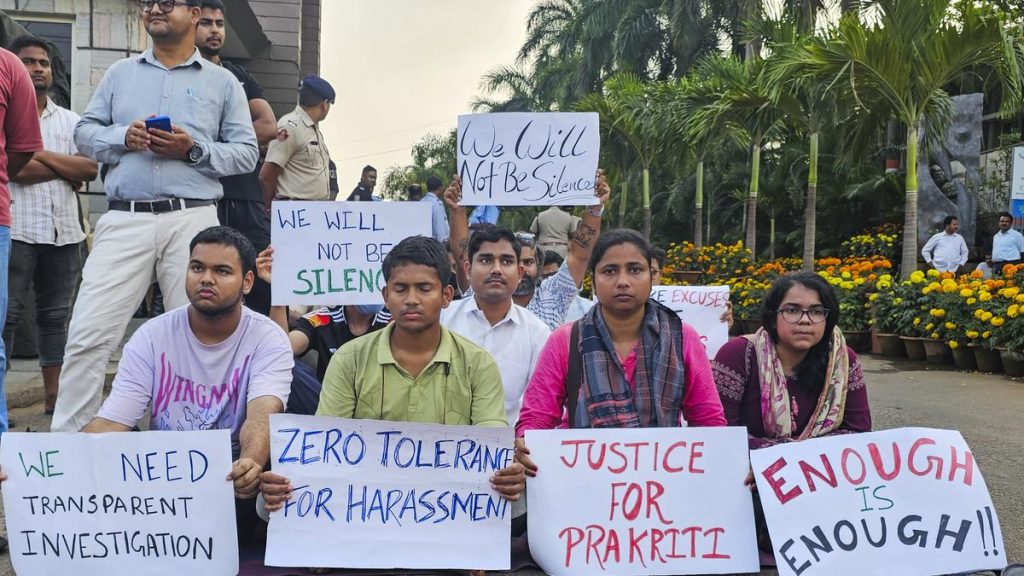Universities are supposed to be places of learning, discovery, and maybe a little bit of last-minute assignment panic. But what happens when a prestigious institution becomes the epicenter of a scandal so big it forces two countries to get involved?
Welcome to KIIT University in Odisha, India, where the tragic death of a young Nepali student has set off protests and raised diplomatic concerns.
#WATCH | Odisha: A https://t.co/jHgpcuG1h1 third-year girl student from Nepal was found dead in KIIT University (Kalinga Institute of Industrial Technology) hostel in Bhubaneswar on 16th February. As per a notice issued by the University, the institute is hence closed sine die… pic.twitter.com/vVfgY140up
— ANI (@ANI) February 17, 2025
On February 16, 2025, Prakriti Lamsal, a third-year BTech student, was found dead in her hostel room. Authorities quickly labeled it a suicide, but what followed next has left everyone questioning whether justice will ever be served.
With accusations of blackmail, a politically connected accused, and an administration seemingly more focused on damage control than truth-seeking, this case has taken a dark and twisted turn.
Who is The Alleged Accused?
But who is the boy question? He is a fellow student at KIIT who is being described as manipulative and abusive. According to the initial investigation, Advik allegedly subjected Prakriti to relentless harassment, and there are even whispers of blackmail.
Despite Prakriti seeking help from the university administration, her complaints fell on deaf ears. She had tried to take a stand, reaching out to the International Relations Officer at KIIT, yet no action was taken against the accused. And then, on the night of a campus concert, she took the ultimate, heartbreaking step.
The Alleged Accused Has Political Connections
A day after her death, the police arrested Advik Srivastava under Section 108 of the Bharatiya Nyaya Sanhita (BNS) for abetment of suicide.
A routine case?

Hardly. Advik isn’t just any student—he’s the son of Manoj Srivastava, a BJP leader from Uttar Pradesh. And here’s where things get murky. Was his father’s political clout a factor in how the university handled—or rather, failed to handle—the case?
Instead of ensuring justice for Prakriti, the university administration seemed more interested in suppressing the incident. Students demanding answers were met with bouncers and guards, who allegedly resorted to violence. Protests were crushed, and an eerie silence took hold on campus.
KIIT Tries To Suppress Protests
Now, this is where the story takes a jaw-dropping turn. Instead of ensuring that justice was served, KIIT went into full-blown crisis management—except their idea of handling a crisis was suppressing protests and forcefully evicting students. Yes, you read that right.
#BREAKING: Nepali students protest outside the Indian Embassy in Kathmandu after mistreatment faced by students at KIIT University in Odisha, India. Prakriti Lamsal, a third-year B Tech student from Nepal, died by suicide at the University after facing molestation by a student. pic.twitter.com/iIfx78RaW5
— Aditya Raj Kaul (@AdityaRajKaul) February 17, 2025
Over 500 Nepali students were suddenly told to pack their bags and leave. They weren’t given time, explanations, or even proper transport. Some were forced onto buses and dumped at Cuttack Railway Station. It was as if the university thought, “If we remove all the students demanding justice, maybe the problem will disappear!”
Spoiler alert: It didn’t.
The eviction of Nepali students sparked outrage—not just on social media but at a diplomatic level. The Nepalese Prime Minister himself had to step in, dispatching officials to ensure the safety of the affected students.
Our Embassy in New Delhi has dispatched two officers to counsel Nepali students affected in Odisha.
— K P Sharma Oli (@kpsharmaoli) February 17, 2025
Additionally, arrangements have been made to ensure they have the option to either remain in their hostel or return home, based on their preference. #Nepal #Odisha
Protests erupted outside the Indian Embassy in Nepal, with students refusing to let the injustice slide. KIIT had not just mishandled a student’s tragic death—it had managed to create an international fiasco.
KIIT Plays Cool
As videos of KIIT’s high-handedness flooded social media, the university suddenly realized it had a PR disaster on its hands. Enter phase two: Damage Control.
At first, KIIT tried to play it cool with vague, half-hearted statements. When that failed, they scrambled to offer up sacrificial lambs. First, warden Manjusha Pandey was shown the door after her racist and insensitive remarks about Nepalese students went viral. Then, bouncers and guards who had assaulted protesting students were also removed.
APPEAL!
— KIIT – Kalinga Institute of Industrial Technology (@KIITUniversity) February 17, 2025
There was an unfortunate incident which took place late in the evening yesterday on the KIIT campus. Immediately after the incident, police investigated the matter and apprehended the culprit.
The KIIT administration has taken all-out efforts to restore normalcy in the… pic.twitter.com/0o3vFs2TWi
Now, in a new development, the police have arrested five more KIIT employees for physically attacking Nepalese students while forcing them to vacate the hostel. CCTV footage confirmed that these staff members had assaulted the students on February 19 when they weren’t moving fast enough. The victims were abused, beaten, and chased away in a scene that looked more like an eviction raid than a university campus.
With these latest arrests, the total number of those taken into custody in the KIIT fiasco has risen to 11. Among them is engineering student Advik Srivastava, booked for allegedly abetting Prakriti Lamsal’s suicide. The five newly arrested staff members were denied bail and sent to judicial custody for 14 days.
But what about the top officials who gave the orders? The ones who decided that throwing out 500 students overnight was a great idea? The ones who ignored Prakriti’s pleas for help? So far, they remain untouched
This is a classic move straight out of the Crisis Management Handbook: Fire the foot soldiers, keep the generals.

Where Do We Go From Here?
This case raises a lot of uncomfortable but necessary questions. Why was Prakriti’s initial complaint ignored? Why was the accused reportedly given a free pass despite allegations of harassment and blackmail? And why did KIIT react with such extreme measures, as if protecting the university’s image was more important than seeking justice?
The accused, Advik Srivastava, has finally been arrested under the abetment of suicide charge. But let’s be honest—if it weren’t for the massive public outrage and diplomatic pressure, would this have even happened? Or would this case have been buried like so many others before it?
If Indian universities continue down this path—favoring the powerful, suppressing the vulnerable, and treating students like disposable assets—then the future looks grim. If Nepalese students no longer feel safe studying in India, they might turn to other countries. Maybe China or even Pakistan and Europe. And then what? Will India complain about losing international students without reflecting on how it treats them?





